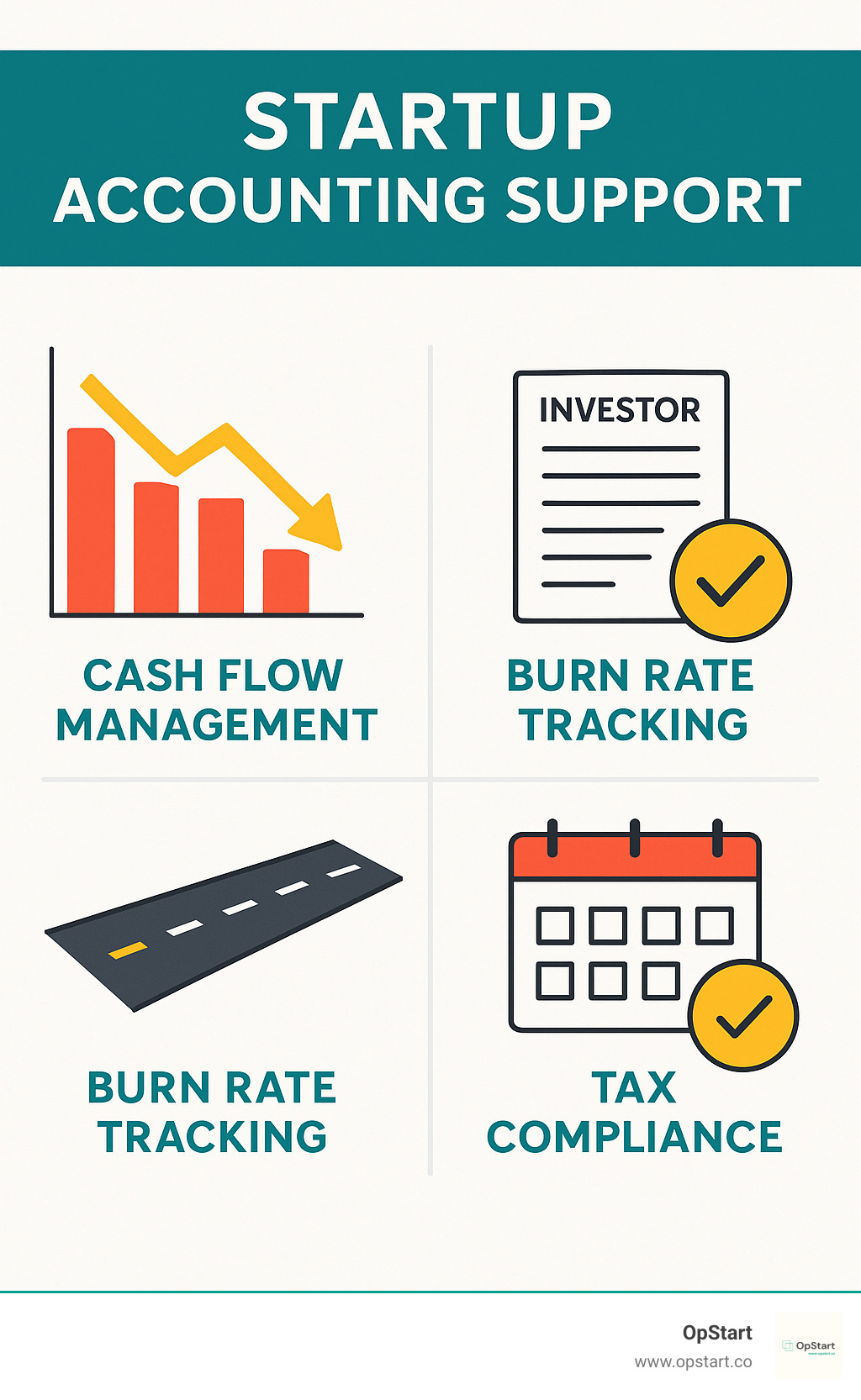Why Every Growing Startup Needs Professional Financial Support
Startup accounting support is the specialized financial guidance and services that help growing companies manage their books, stay compliant, and make data-driven decisions. Here’s what you need to know:
Core Services:
- Bookkeeping & Financial Statements – Monthly P&L, balance sheets, cash flow tracking
- Tax Compliance – Federal/state filings, R&D credits, Delaware franchise tax
- Strategic CFO Support – Budgeting, forecasting, investor reporting
- Growth Operations – Payroll, billing, expense management, fundraising prep
Key Benefits:
- Frees up founder time to focus on core business
- Provides investor-ready financials for fundraising
- Ensures tax compliance and maximizes credits
- Scales with your company from seed to Series C
82% of failed ventures cite cash flow problems as the reason for failure. But accounting isn’t just about avoiding failure; it’s about creating a strategic advantage.
When Kate Beard, Head of Operations at Wendy, partnered with expert accounting support, she noted: “The mental load OpStart has taken off our plates is immense. Plus, it’s up leveled our financial presentations for investors.”
Modern startups face unique challenges that traditional bookkeeping can’t handle. You’re dealing with VC funding rounds, stock options, rapid scaling, and complex revenue models. Generic accounting approaches weren’t built for your world of SAFEs, board decks, and burn rate optimization.
I’m Maurina Venturelli, and I’ve seen how proper startup accounting support transforms companies. At OpStart, we’ve learned that the right financial foundation isn’t just about compliance—it’s about giving founders the clarity and confidence to build market-leading companies.

Startup accounting support glossary:
The Foundation: Core Accounting Services Every Startup Needs
Every startup, regardless of its stage or industry, requires a solid financial foundation. This begins with core accounting and bookkeeping services that ensure accuracy, transparency, and compliance.
Understanding Your Financial Health
At the heart of solid startup accounting support lies accurate bookkeeping. Bookkeeping is the systematic recording of all financial transactions, from every dollar spent to every dollar earned. It’s the meticulous work that underpins everything else, providing crucial financial transparency.
From this data, we generate essential financial statements:
- Profit & Loss (P&L) Statement: Also known as an income statement, this shows your company’s revenues and expenses over a period, revealing your net profit or loss. Understanding your P&L is vital for assessing profitability. You can learn more about How to Read a P&L.
- Balance Sheet: This provides a snapshot of your company’s financial health at a specific point in time, detailing assets (what you own), liabilities (what you owe), and equity (the owners’ stake). Find How to Read a Balance Sheet.
- Cash Flow Statement: This tracks the actual cash coming into and going out of your business. For startups, understanding your Statement of Cash Flows is critical, as 82% of failed ventures cite cash flow problems as their downfall.
We also help you steer the nuances of accounting methods, specifically Cash vs. Accrual Accounting. Most serious startups and VC-backed companies operate on an accrual basis for more accurate financial reporting and investor readiness.
Managing Day-to-Day Operations
Beyond the core statements, daily financial operations are crucial. We handle:
- Accounts Payable (AP): Managing what your company owes to vendors and suppliers, including processing bills and ensuring timely payments.
- Accounts Receivable (AR): Managing what your customers owe you. This involves invoicing, tracking payments, and ensuring you get paid promptly to improve cash flow.
- Payroll: Ensuring your team is paid accurately and on time, handling all associated taxes and compliance.
- Expense Management: Tracking and categorizing all business expenses for accurate reporting and maximizing potential tax deductions.
Entrusting us with these operations frees founders from time-consuming tasks, allowing them to focus on product development and growth. A great bookkeeper (or a team of them!) truly pays for themselves. For more on this, check out 8 Ways a Great Bookkeeper Pays for Themselves (and Then Some).
Why Specialized Startup Accounting Support is a Game-Changer
Your startup isn’t just a small business; its financial needs are completely different. You’re building a rocket ship, not a corner store.
Traditional accounting services work for established businesses with predictable cash flows, but startups operate in a world of VC funding rounds, rapid scaling, and new business models. Generic, non-specialized accounting approaches simply weren’t built for your reality.
You’re dealing with SAFEs and convertible notes, not simple loans. Your revenue might come from SaaS subscriptions or marketplace transactions, each with its own complexities. You’re tracking burn rate and runway, and you need to be ready to scale from 5 employees to 50 in six months.
This is where specialized startup accounting support is essential. We understand that at seed stage, you need compliance and cash flow tracking. At Series A, you need departmental budgeting and investor reporting. By Series C, you’re looking at audit preparation. The difference is strategic: we know your books need to tell a story that resonates with investors.
Preparing for Fundraising and Due Diligence
Nothing kills a funding round faster than messy financials. I’ve seen promising startups lose investor interest because their books weren’t investor-ready—an entirely avoidable situation.
Investor-ready financials are about presenting your story clearly. Investors need to see your burn rate, understand your unit economics, and trust that you know where every dollar goes. We help create board decks that highlight the right metrics and tell your growth story.
For due diligence support, preparation is everything. Investors will dig into every transaction and stock option grant. We ensure you have proper documentation ready, including critical items like 409A Valuations for Startups. As finance expert Ben DeMordaunt knows, having your financial house in order makes the process smoother.
The complexity of SAFEs and other startup funding instruments requires specialized knowledge. We’ve handled hundreds of these transactions and know how to account for them properly.
Scaling Your Financial Operations for Growth
Your startup’s growth won’t be predictable. Your financial operations need to keep up without breaking.
Scalability means building systems that grow with you. We establish processes and tech stack integration that handle this growth seamlessly, working with your preferred software—whether that’s Stripe for payments, Expensify for expenses, or other tools in your stack.
The growth stages from seed to Series C each bring unique challenges. We’ve guided companies through each stage and know what’s coming next.
Even fundamental decisions like Choosing Your Business Structure: C-Corp vs. LLC have major implications for your accounting and tax strategy. We provide guidance on these critical choices.
This specialized approach means you can focus on building your product, knowing your financial operations are handled by experts who understand the startup journey. For more insights, check out Startup Accounting Services: What Founders Need to Know.
From Compliance to Strategy: The Expanded Role of Accounting
Modern startup accounting support has evolved beyond basic bookkeeping. Today’s financial teams serve as strategic partners, helping founders make data-driven decisions that fuel growth.

While compliance keeps you out of trouble, strategic financial guidance helps you win. The best accounting partners don’t just report on the past—they help you plan for the next quarter, year, and funding round.
This expanded role includes strategic budgeting and forecasting. We help you model growth scenarios, plan for fluctuations, and understand how decisions will impact your runway. When considering a new hire or market expansion, solid financial modeling provides confidence.
Fractional CFO services bridge the gap between bookkeeping and a full-time finance executive. For most startups, a seasoned CFO isn’t realistic until later stages. Fractional support gives you access to senior-level expertise for board presentations, cash flow optimization, and more. Learn about Fractional CFO Services and how they can transform your operations.
The Power of Technology and Automation in Startup Accounting Support
Technology has transformed startup accounting support, making it faster, more accurate, and more insightful.
AI-powered categorization sorts your expenses automatically with up to 95% accuracy. The system learns your patterns and handles tedious work, freeing up time for strategy.
Automated reconciliation connects to your bank accounts and payment processors, matching transactions in real-time. What used to take days now happens automatically, saving teams hundreds of hours annually.
Real-time reporting is the real game-changer. Modern tech stacks provide instant dashboards showing your cash position, burn rate, and key metrics, so you’ll always know the answer.
Our modern tech stack integrates with the tools you’re already using. Whether you prefer Stripe, Brex, or Gusto, we work with your existing ecosystem. No forced migrations or learning new systems.
This technological leap allows us to close books 50-75% faster while providing immediate insights. Instead of data entry, we focus on analysis and strategic recommendations.
Navigating Tax Compliance and Maximizing Credits
Tax compliance is critical, and getting it right can put money back in your pocket.
Tax planning goes beyond filing returns. We work proactively to minimize your tax burden and maximize deductions, often saving startups thousands annually.
For federal and state filings, we handle all paperwork and deadlines. If you’re incorporated in Delaware, we also manage your Delaware Franchise Tax, which can be tricky to calculate correctly.
R&D Tax Credits are a massive opportunity that many startups miss. If you’re developing new products or building software, you likely qualify.
These credits can offset income taxes, but eligible startups can apply up to $500,000 annually against payroll taxes instead. This directly improves your burn rate and extends your runway.
We help you determine if you Do You Qualify for R&D Tax Credits? and handle the complex documentation required. The process can be involved, but the payoff is substantial. For a complete overview, check out Startup Taxes: Outsourced.
Strategic tax planning and expert compliance keep more cash in your business, allowing you to focus on growth.
How to Choose the Right Accounting Partner for Your Startup
Choosing the right startup accounting support partner is a pivotal decision. It’s not just about crunching numbers; it’s about finding a strategic ally who understands the startup world.
Your financial partner is like a co-pilot, helping you plot the best course for growth.
Here’s a quick comparison to help you weigh your options: managing your accounting in-house versus partnering with a specialized service like OpStart.
| Factor | In-house Management | OpStart Outsourced Services |
|---|---|---|
| Cost | High (salary, benefits, software licenses, training) | Predictable (flat-rate pricing, often less than full-time hire) |
| Time Commitment | Significant for founders (hiring, managing, oversight) | Minimal for founders (hands-free, expert-managed) |
| Expertise | Varies (dependent on individual hire, limited scope) | Diverse (team of specialized startup finance experts) |
| Scalability | Challenging (need to hire/train as you grow) | Seamless (services adapt to your growth stages) |
| Focus | Distracts from core business | Allows founders to focus on product and growth |
| Technology | Requires research, setup, and maintenance | Uses best-in-class tools, integrates with yours |
A specialized outsourced service often provides superior value for a growing startup. The depth of expertise, scalability, and cost-effectiveness of a dedicated team like OpStart can be a game-changer, freeing you to focus on building your business.
Key Questions for a Potential Provider of Startup Accounting Support
To choose the best fit, ask these critical questions to see if a potential partner is equipped to support your startup’s journey.
First, do they have specific startup experience? You need a partner who understands VC funding, burn rates, SAFEs, and the challenges of rapid growth. They should speak your language and anticipate your needs. At OpStart, we live and breathe startup finance.
Next, can their services scale with your growth? As you grow from seed to Series C, your financial needs become more complex. Your partner should handle increased transaction volumes, international operations, and audit preparation. We are built to scale with you.
Then, consider what’s their tech stack, and how do they integrate with yours? A modern accounting partner must leverage technology for automation and real-time insights. Crucially, they should integrate with your existing tools. You shouldn’t have to overhaul your operations to fit their system. We integrate with any preferred software stack, providing smart recommendations without forcing new systems.
It’s also vital to ask, what does their reporting process look like? How often will you receive statements? What insights will they provide? Will they help you track KPIs relevant to your business and investors? At OpStart, we provide clean, accrual-basis financial statements monthly, reviewed by a dedicated controller. We’re always available to answer your questions.
Finally, what’s their pricing model? Look for transparency. A flat-rate model helps you budget effectively. We believe in clear, flat-rate pricing, so you always know your costs upfront.
Choosing the right startup accounting support means finding an extension of your team. It’s about getting expert oversight and quick feedback, giving you the peace of mind to focus on building your business. Ask yourself, Is Your Bookkeeping Good Enough?
Frequently Asked Questions about Startup Accounting
It’s normal to have questions about your startup’s finances. Let’s break down some of the most common ones.
What are the most important financial KPIs for a startup to track?
Understanding your company’s vital signs is essential for making smart decisions and attracting investors. A few key performance indicators (KPIs) are non-negotiable for every founder:
- Cash Runway: This tells you how many months your startup can operate based on your current cash balance and spending rate. It’s your lifeline.
- Burn Rate: This is the rate at which your company is spending its cash, which helps you understand how quickly you’re using your runway.
- Monthly Recurring Revenue (MRR): For subscription businesses, MRR shows the predictable, ongoing revenue you can expect each month, a huge indicator of stability.
- Customer Acquisition Cost (CAC): How much does it cost to bring in a new customer? This KPI helps you understand the efficiency of your sales and marketing.
- Lifetime Value (LTV): This estimates the total revenue a customer will generate. Ideally, your LTV should be significantly higher than your CAC.
These KPIs paint a clear picture of your operational efficiency and growth potential. With expert startup accounting support, you’ll always have these numbers at your fingertips.
Can my startup get R&D tax credits even if we’re not profitable?
Yes, absolutely! This is an exciting and often overlooked opportunity for startups, especially those not yet profitable. Even if your company isn’t making a profit, you can often use R&D tax credits to directly offset your payroll taxes.
This means cash flows directly back into your business, improving your burn rate and extending your cash runway. Eligible startups can claim up to $500,000 in refundable R&D Tax Credits annually. It’s a fantastic financial boost that many founders don’t realize they qualify for. We specialize in helping you maximize these credits. For more details, check out Changes to the R&D Tax Credit: What Founders & CEOs Need to Know.
What’s the difference between a bookkeeper, an accountant, and a fractional CFO?
These roles are often confused, but each plays a vital part in your financial ecosystem:
- Bookkeeper: Your bookkeeper is the record-keeper. Their primary responsibility is the day-to-day recording of all financial transactions, ensuring every dollar is accurately categorized.
- Accountant: An accountant takes the bookkeeper’s data and transforms it into insights. They analyze numbers, prepare financial statements (P&L, Balance Sheet, Cash Flow), reconcile accounts, and handle tax preparation.
- Fractional CFO: This is your strategic financial partner. A Fractional CFO provides high-level guidance without the cost of a full-time executive. They focus on budgeting, forecasting, financial modeling, fundraising support, and advising on critical business decisions.
Many growing startups find a comprehensive startup accounting support solution that combines these roles through an outsourced team provides a full spectrum of financial expertise without the overhead. To dive deeper, learn more in Fractional CFO vs. Bookkeeper vs. CPA: What’s the Difference?.
Conclusion: Build a Strong Financial Future for Your Startup
Building a startup is hard enough without worrying about your books or missing tax credits. The numbers don’t lie: 82% of failed ventures cite cash flow problems as their downfall. With proper startup accounting support, financial management becomes a competitive advantage.
Every hour you spend wrestling with accounting software or trying to understand Delaware franchise tax requirements is an hour not spent talking to customers, refining your product, or closing your next funding round. When you partner with specialized accounting experts, you’re buying back your most valuable resource: your time and mental energy.
Instead of reconciling bank statements, founders focus on strategy. Instead of scrambling for investor updates, they have clean financials ready. Instead of worrying about compliance, they maximize R&D credits that put real money back into their business.
At OpStart, we’ve built our approach around the unique rhythm of startup life. We know your needs will change as you scale. That’s why our full-stack financial operations grow with you—from basic bookkeeping to complex financial modeling and audit preparation.
Our hands-free, expert-managed approach means you get the benefits of an entire finance team without the overhead. With flat-rate pricing and seamless integration with your existing software, you get clean books, strategic insights, and peace of mind.
Your startup’s financial health is too important to leave to chance. Every successful company we’ve worked with started with the same decision: investing in proper financial infrastructure early.
Ready to stop worrying about the numbers and start using them to fuel your growth? Get started with expert bookkeeping services and build the financial foundation your startup deserves.


